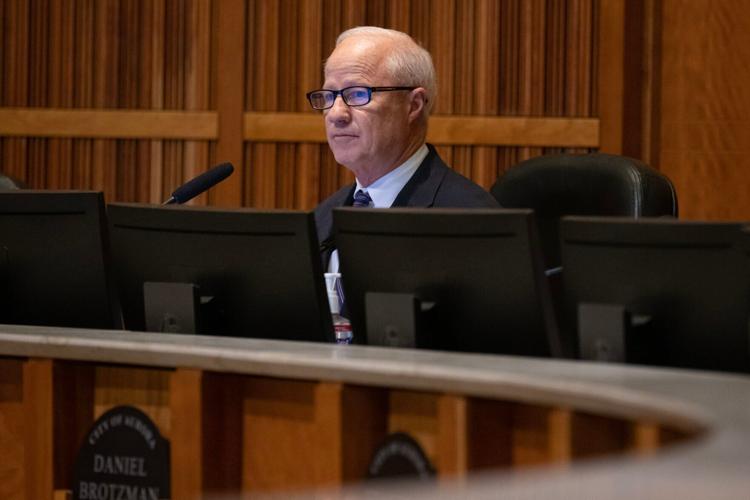‘Tough’ or ‘soft’ on crime? That framing misses the point, experts say | COVER

Denver District Attorney Beth McCann addresses her office's efforts to keep city youth safe during a public safety press conference on April 25, 2023. McCann highlighted the handgun intervention program and said early indications show the program having a positive impact on Denver youth. (Alex Edwards/The Denver Gazette).
Alex Edwards/Denver Gazette
Amid the often-polarizing debates over crime at the state Capitol, the officers and experts who actually deal with criminal cases on a daily basis argued that to judge Colorado based on whether it is “soft” or “hard” entirely misses the point.
The goal, they said, is to strike just the right balance.
Veer too far to the left — and it becomes a problem.
Veer too far to the right — and it becomes a problem.
What’s also true, they added, is that policies coming out of the state Capitol have real consequences for the accused, the victims and their families, as well as for law enforcement, district attorneys and judges.
Often, people describe the policy debate in binary terms: On one side, Republicans and law enforcement leaders push for or defend laws that levy more penalties for crime, while Democrats and their progressive allies focus on rehabilitation and so-called “harm reduction” strategies.
Given their dominance at the state Capitol, Democrats have succeeded in moving the needle toward “harm reduction,” a broad concept that fundamentally accepts drug use as a reality in society and insists that the proper response is to “minimize its harmful effects rather than simply ignore or condemn them.”
Among the best expressions of this philosophical viewpoint is Oregon’s decriminalization experiment, though lawmakers in that state have since pulled back after overdose deaths there skyrocketed.
Foremost in the minds of voters, crime is also not just a matter of public safety — it’s also a matter of reputation, officials note.
“Perception can quickly become reality without action,” Aurora Mayor Mike Coffman pointed out.
District attorney: Colorado’s policy pendulum must not swing too far in either direction
District attorneys from Douglas, Adams, and Denver counties emphasized there is no one-size-fits-all approach to crime. The three district attorneys said framing the state’s success in combatting crime using the soft-or-hard analogy is a cliché revived mostly during election years.
“I don’t accept the premise of hard versus soft,” said Brian Mason, the district attorney for the 17th Judicial District, which serves Adams and Broomfield counties. “When the two choices are only tough or soft, it misses the fact that you can do both in the appropriate ways.”
To do that, Mason said a district attorney must aggressively prosecute violent criminals who pose a risk to society, while taking a softer approach to other offenders who need help getting back on track.
District attorneys Beth McCann, a Democrat, and John Kellner, a Republican, agree with Mason.
“There are cases and people where we need to be aggressive because of community safety issues,” said McCann, who has decided against running for reelection as Denver’s top prosecutor. “But there are other cases where past trauma, substance abuse, or mental health issues require a better way to make sure the person doesn’t come back.”
McCann said “restorative justice” programs for those who need help are essential to the criminal justice system.
In an email, Christie Donner, executive director of the Colorado Criminal Justice Reform Coalition, also said that “soft” and “hard” are nothing more than “political words and are really meaningless from a public safety impact lens.”
“For us, the question that should guide public safety policies, practices and funding is what works,” she added. “That’s a very different conversation than what usually happens, especially during an election year.”
Kellner, the Republican district attorney for the 18th Judicial District, which currently covers most of Douglas and Arapahoe counties, said the “pendulum” on crime should never swing too far to one side or the other.
“I definitely think the people who engage in the real soft-on-crime approach need to change,” he said. “When the pendulum swings too far, you have to work to get it back to the middle. You have to work to be right on crime. With major crimes, there is no doubt, you have to be aggressive.”
Kellner said those setting policy at the state level sometimes need to understand the importance of being tough.
Consider the following, he said.
In the 18th Judicial District, which processes up to 25,000 to 30,000 cases annually, most offenders enter the system without a criminal history.
“These are the cases where they don’t need to go to jail but need some help,” Kellner said. “It’s not being soft on crime here. This is treating people based on circumstances.”
Contrast that with the penalty phases for murders, he said.
Noting a recent case in Aurora, in which an Arapahoe County jury found 22-year-old Joseph Castorena guilty of four counts of first-degree murder, Kellner said he would be sentenced to life, just as a defendant who kills a single individual would, even though he shot and killed four people.
Urging to bring back the death penalty, Kellner said a defendant who killed multiple innocent people should face stiffer penalties.
Aurora mayor: Useful innovations
Coffman, the Aurora mayor, said while he believes harsher penalties are needed for a variety of crimes, he agrees the system continues to evolve to help people who need it, noting that mental health issues have been an issue for law enforcement for years.
That has led to many departments developing community response teams that accompany officers to calls involving people suffering from mental health issues.
“There are innovations on the left that have been useful,” he said.

FILE PHOTO: The Colorado state Capitol in Denver.
HaizhanZheng/iStockphoto

FILE PHOTO: The Colorado state Capitol in Denver.
However, while Coffman said there have been strides made in addressing mental health, he believes the state’s Democratic-controlled legislature is taking the state backward when it comes to crime by chasing what proponents have called a more “holistic” approach.
Broadly speaking, that’s the idea that crime is less a matter of personal responsibility but more the result of societal forces.
“I don’t think we are in a good position relative to other states,” Coffman said.
In Aurora, Coffman said city leaders grew tired in 2021 and 2022 of waiting for the state legislature to address car theft. In 2022, the Aurora council passed a measure imposing mandatory jail time for people convicted of stealing cars.
Almost a year later, at the urging of the governor, lawmakers passed a law that made all car thefts a felony, decoupling the severity of the crime from the value of the car and tying it instead to behavior so that the penalty becomes more severe with repeat offenders.
Sen. Rachel Zenzinger, an outgoing senator from Arvada who championed the legislation, said that while she knew at the time that the bill was not the “silver bullet” that would fix everything, something had to be done to right the ship.
Some officials have now cited the law as having had a significant effect on curbing car thefts, especially in the Denver metro area, which accounted for almost 40% of all stolen vehicles.
In 2023, the statewide data showed 38,223 car thefts, a decrease from a record high of 47,052 the year before, the peak of a three-year trend, according to Colorado crime statistics.
Battle over crime policy moves to the ballot box
Some critics said the legislation is about two years too late.
Arguing that the state’s Democratic-controlled legislature does not act promptly to address problems, a group is pushing a couple of measures on the election ballot in November to infuse more money into law enforcement and to require that convicted criminals actually serve a specific time of their sentence.
Kristi Burton Brown, executive vice president of Advance Colorado, said when lawmakers don’t act, it’s time to let the people decide which direction they want the state to go.
Advance Colorado — which argued that Colorado has turned into a “testing ground” for “some of the most liberal policies and plans in the nation — is pushing Initiative 112 and Initiative 157.
Initiative 157 seeks to compel the state to fund public safety by allotting more than $350 million annually for law enforcement recruiting, training and death benefits. Brown insisted this is not a tax increase.
Initiative 112 aims to keep violent criminals in prison longer.
Brown argued that parole boards are getting out of hand by effectively giving criminals who have been convicted of violent crimes, such as murder and rape, shorter sentencing. Brown noted that criminals are serving as little as 40% of a sentence and being paroled.
Under the initiative, violent criminals would be required to serve 85% of a sentence before being eligible for parole.
Brown said Advance Colorado has tried working with lawmakers to pass a measure during the legislative session, but the effort continuously fails in committee.
Organizers have until Aug. 5 to gather enough signatures to qualify for the November ballot.
Colorado is not the only state where voters are deciding.
After years of increased crime rates and frustration with their city council’s inaction, San Francisco voters approved a handful of measures in the March election to set minimum police staffing levels, allow officers to chase suspects, and set up public safety cameras with facial recognition technology.
Fighting fentanyl
Sen. Bryon Pelton, a Republican from Sterling, said Colorado lawmakers have become too soft and too afraid to crack down on the growing crime rates, noting that Colorado was leading most national lists for the highest car theft rates before the legislature passed the 2023 law.
“Bottom line, we are not very hard on crime here,” Pelton said. “We don’t have enough Democrats on our side to do anything.”
Like car thefts, Pelton said he worries that the drug issues in Colorado are going to get even worse.

The U.S. Drug Enforcement Administration's Rocky Mountain Field Division is on pace to break its Colorado fentanyl seizure record of 2.61 million pills from the 2023 fiscal year. (Gazette file photo)

The U.S. Drug Enforcement Administration’s Rocky Mountain Field Division is on pace to break its Colorado fentanyl seizure record of 2.61 million pills from the 2023 fiscal year. (Gazette file photo)
Following the 2024 session, Pelton said he attended a town hall in Fort Morgan where citizens complained mostly about drug crimes. When data shows that violent crimes increase with drug use, Pelton said Colorado is putting itself in a “terrible place.”
Last year, the U.S. Drug Enforcement Administration’s Rocky Mountain Field Division seized 2.61 million fentanyl pills in the state, setting a new record.
Nearly 1.8 million fentanyl pills have been seized by the DEA’s Rocky Mountain Field Division in 2024 so far. With four months left in the federal fiscal year, the department expects to surpass last year’s record.
According to the Centers for Disease Control and Prevention, while the national average in drug overdose deaths dropped between December 2022 and December 2023, in Colorado it spiked by 3.9%.
Part of the problem, according to some, are laws passed in 2019 and 2022, in which lawmakers voted to make it a misdemeanor for those caught with fentanyl. Republicans argued that their bill this year, died in committee, would fix that problem.
In 2022, lawmakers effectively rolled back a 2019 bill that lowered the penalty for possession of less than 4 grams of Schedule II drugs, which includes fentanyl. Responding to the public outcry over drug overdoses and at the urging of Gov. Jared Polis, lawmakers passed a law that heightened the felony charges for possession of 1 to 4 grams of any substance containing fentanyl.
The criminal penalty increased above 4 grams, but under 1 gram, possession is a misdemeanor.
The legislation made nobody happy. Advocates from both sides of the debate criticized it as either too harsh or too lenient. Republicans, some district attorneys and local officials argued that no dose of fentanyl is safe and that the state should have adopted a zero tolerance policy toward the drug, while harm reduction advocates said the law went too far in punishing drug possession.
Rep. Mike Lynch, who introduced House Bill 1306, characterized his proposal as a follow-up to laws passed during the 2019 and 2022 sessions, which, he said, is leading to situations where too many people caught with fentanyl only face misdemeanors when they declare, as a defense, they did know the drugs they carried contained fentanyl.
Democrats, meanwhile, worry about increasing the possibility of sending people who need help with drug abuse to jail.
Kellner, who has opted not to run for reelection this year, said he believes possession of any amount of fentanyl should be a felony.
“I know some oppose it because they say it is over-criminalizing,” he said. “But a felony might just incentivize someone to get treatment.”
The Oregon experiment
Pelton said he fears that Colorado is headed to the same situation has Oregon found itself.
In 2020, Oregon enacted the first-in-the-nation law that decriminalized drug use. Approved by voters, the measure directed hundreds of millions of dollars toward addiction services and gave those found possessing hard drugs a $100 citation or a health assessment. The law became effective in 2021, under which drug offenses may only be punished by a fine — no jail, supervision or any other criminal penalty.
Behind the measure is the belief that a “health-based approach to addiction and overdose is more effective, humane and cost-effective than criminal punishments.”
State data later showed that few opted for health assessments and paid the fine. More consequently, overdose deaths skyrocketed in Oregon — from 472 in 2020 to 738 in 2021, the year decriminalization law took effect.
By 2022, the state saw 956 overdose deaths. Last year, Oregon recorded 628 deaths by June, which means 1,250 people are on track to die from overdoses, assuming the trend holds.
Oregon’s lawmakers — some of whom recounted having family members who have died of overdoses, have since decided to recriminalize drugs. Gov. Tina Kotek signed the legislation to once again make possession of small amounts of drugs a crime.
“Oregon has learned a difficult lesson and paid a high price for entirely decriminalizing drug abuse,” said Mason, the district attorney. “Drug use is an absolutely enormous problem. We have to have prevention and healthcare options that include law enforcement and the justice system.”
Coffman said the streets of Aurora, like most Colorado cities, are struggling with drug use, especially among the homeless population. Every new drug is more “lethal and cheaper” than the last, he said.
At one time, it was meth and crack, Coffman said.
Today, it’s fentanyl.
Perception is reality
Making national lists for high crime rates, drug use or any other negative publicity is a problem for any state.
It’s also ultimately a problem for that state’s economy, some said.
But DJ Summers, director of policy and research at the Common Sense Institute, said perception is hard to overcome.
“The public has a huge response to perception,” he said. “Areas perceived to have high crime rates get less foot traffic, which leads to reports of downtown businesses closing up shop.”
Coffman agreed with Summers, saying that’s why Aurora has taken action.
Known for high retail theft rates, the Aurora City Council mandated that individuals face jail time for being caught with $100 in stolen goods.
Recently, U.S. News and World Report ranked Colorado the third “most dangerous” state in the U.S. for 2024. The report said the rankings were determined by factoring in violent crime and property crime rates in each state using FBI data from 2022.
McCann disputed that narrative in Colorado, stating that crime in Denver has decreased in almost every sector in 2024 and noting that violent crime and car thefts are down by double digits.
Summers said national rankings painting a negative picture means a business looking to relocate or open a new location may be skeptical of Colorado. That also means families moving may reconsider the Denver metro area, in particular.
“The issue is not necessarily about the message being sent to the criminals, but the message being sent to the law-abiding citizens,” Summer said. “Public perception in Denver and Colorado has an issue with crime and safety. Businesses can see that as a problem.”



















